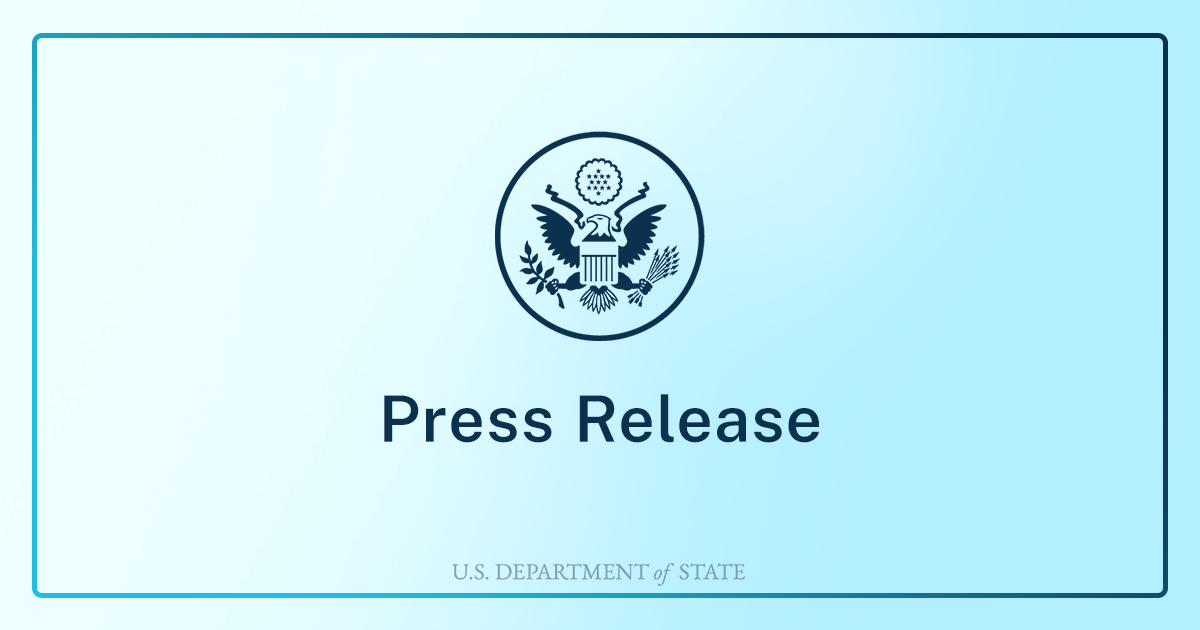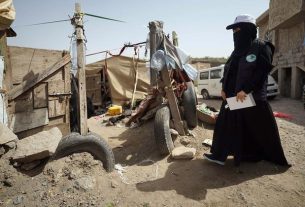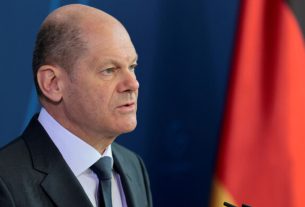DEPUTY SECRETARY CAMPBELL: So good afternoon, everyone. I want to open by recognizing and thanking everyone who has worked over the preceding weeks and months to organize the council ministerial. I especially want to acknowledge Energy Commissioner Simson as the senior participant in the session of this energy council. Commissioner Simson has led the charge in deepening the transatlantic energy alliance and helping us in particular to mobilize our countries and our companies in response to Russia’s brutal and unprovoked invasion of Ukraine and in response to Putin’s weaponization of Kremlin’s energy resources. It’s appropriate to just say thank you just quickly. (Applause.) We really would not be where we are today, celebrating our successful defeat of Russia’s energy weapon and looking ahead confidently to an energy transition future, without her leadership, her determination, and her courage over the past several years.
I know Secretary Blinken would have very much wished to be with here – with us here today, but I will tell you it’s a good excuse. He is in Europe, reaffirming our alliance with the continent, working on other issues.
I also want to thank my friend and my partner, Deputy Secretary Turk, sitting to my left; acting Deputy Secretary General Martinez Carbonell; and the Deputy Chief of Mission Karlshausen, and I’ve had a chance to work with her on many issues in the Indo-Pacific. So your leadership, your partnership, are crucial to our success in strengthening transatlantic energy cooperation and working on other issues as well.
Now, to start off this discussion, it’s worth taking a step back and place our meeting in the proper context. We gather in the face of continued war on the continent as Russia continues to launch targeted attacks on Ukraine’s critical energy infrastructure and exploit energy supply as a tool of coercion. We confront the existential threat of climate change, presenting an urgent need to decarbonize to avoid the worst outcomes. At the same time, our ability to deliver energy through critical transport routes is under increased threat and vulnerability.
The United States in particular is committed to partnering with the EU to meet each of these challenges, both collectively and individually, and to strengthen energy security in Europe and around the globe. We must continue to provide steadfast support to Ukraine, and I know you are all here at a delicate moment. I want to assure you of our strongest possible commitment to continuing to support Ukraine even as we face challenges to get the supplemental through. We are determined to keep the lights on in – on its fight for survival, recognizing the central role energy plays in the war and Ukraine’s economic recovery.
Europe’s remarkable strides redrawing its energy map have helped you diverse away – diversify from Russian energy. The U.S. will remain your partner, from our work together in the Western Balkans to accelerate the energy transition, to support new energy corridors, to the role U.S. producers have played and will continue to play, including the doubling of U.S. LNG exports to Europe last year. We must continue to tighten the screws on Russia’s ability to resupply its war chest and destabilize the energy markets, by strengthening enforcement of the oil price gap, stopping price cap violators, and coordinating where we can on energy sanctions.
As we respond to Russia’s threats to global energy security, we must avoid trading dependence on Russian energy for PRC-dominated clean energy supply chains. And, as importantly, we’ll continue our close collaboration with the EU to create energy investments that support the transition to net-zero emissions on both sides of the Atlantic as we work towards achieving our shared energy and climate objectives.
Our discussions today, our close bilateral coordination every day, are key to making progress on some of the most pressing geopolitical issues around the globe, and I will just say a moment that everything the United States has ever done of consequence on the global stage we have done with Europe. Through this dialogue, as partners, we can align our policies, avoid zero-sum competition, and marshal our shared resources. Thank you, and welcome again to European friends for visiting. I look forward to discussing these challenges and opportunities in our time today. And again, welcome to the State Department.
DEPUTY SECRETARY TURK: Thanks very much, Kurt, and it’s just great to be here with you and Jeff and all of our State Department colleagues, just to work hand in hand. That’s our goal, and it’s just phenomenal to have Kurt in this new position, helping to lead our incredible talent over here at the State Department. I’ve had a chance to work a couple times over here, and it’s just a terrific group of folks, group of colleagues, group of partners.
Let me also rightfully so, Commissioner Simson, if I could, try to embarrass you a little bit for all the phenomenal partnership we had with you and (inaudible) and the full team. The thing I’ve always appreciated about your leadership is it’s steadfast, it’s always consistent, and I think we need that in this particularly challenging time as we’re trying to navigate. What I also admire about you personally – and (inaudible) I think really symbolizes this as well, exemplifies this – is we’re after using energy, clean energy, for the betterment of people, people in our country, people in the European Union, and people around the world. And that humanity really comes through in everything you do, so thank you for being such a terrific partner.
And certainly, want to also welcome, as Kurt did, the acting Deputy Secretary General Martinez Carbonell. Thank you for your team, and our colleague, our DCM from Belgium. It’s been terrific to work bilaterally with Belgium, but multilaterally as well.
We feel incredibly proud of this partnership that’s been built up literally for decades and generations and only strengthened over the last few years. We are all promoting stability and transparency in global energy markets; advancing diverse and resilient energy systems – and I really want to underline “diverse,” diversity of supplies, especially as we think about critical minerals going forward – and demonstrating to the world that clean energy is not only the most abundant and the most affordable, but also the most secure form of energy that we have; and ensuring our energy transitions are just so that no community, no people in our countries, in our societies, but around the world are left behind.
And this bond, as Kurt said – and I think we all not only have spoken about it, but I think we all feel it – has only strengthened since President Putin’s invasion of Ukraine – brutal invasion of Ukraine – and everything that we’ve worked hand in hand going forward. And I personally feel incredibly proud – I know our Secretary does and I know our full team does – to work hand in hand going forward. And I think what this conflict has shown is it’s not only brought us together on energy security, but it’s accelerated our clean energy transition and accelerated our commitment to really accelerating this collaboration even more so between our two countries.
I’m going to digress a little bit from my prepared remarks just to share some analysis that came out quite recently about the progress that Europe has made on your own emissions reductions from energy, and we in the U.S. have made. Our own emissions last year from energy decreased 4.1 percent just in one year. That’s a pretty good number. I’m proud to say I’m a little bit jealous that European emissions actually went down 9 percent just in a single year.
DEPUTY SECRETARY CAMPBELL: Wow, that’s incredible.
DEPUTY SECRETARY TURK: From energy – that is incredible. That doesn’t happen without an awful lot of leadership in Brussels, but throughout the continent, really stepping up.
The most impressive number of all I found in this most recent analysis was if you look at advanced economies – and obviously there’s a lot in Europe, in the U.S., but some of our other partners around the world – our emissions are at the same level that they were 50 years ago. So just think about that, right? Fifty years ago, economy and GDP increased significantly, our emissions went up, but we’ve been able to decrease them to the point we’re at the same level as we were 50 years ago.
If you look at advanced economies, coal use is down to the same level in advanced economies as it was in 1905. So again, when sometimes those of us who focus on climate change and clean energy, you get daunted by what’s ahead of us, it’s good to reflect that we can make progress when we step up, when we walk the talk, and when we partner in the way that we’re partnering here going forward.
Also is a real priority, I know, for President Biden, all of us in this administration, and certainly in Europe as well, as I said, from praising Commissioner Simson – it’s not good enough to save the planet. We have to do right by our own populations, especially those who have been left behind in previous transitions and other times of challenge. So, we’re doubling down, tripling down on that, and very proud that we have a workshop this year on energy poverty policies, where we’ll hear from a group of diverse stakeholders – incredibly important for us to keep focused on that.
Also, incredibly proud that when, as Kurt was saying, there’s nothing that we do that we don’t do hand in hand with our European partners that’s meaningful on the world scene. That’s certainly the case when it comes to energy and clean energy in particular. When our two governments, our two sets of governments can work hand in hand, we can lead the rest of the world, and case and example after example of that in the multilateral setting. We’ve got our work to do, whether it’s clean hydrogen, whether it’s offshore wind, whether it’s energy efficiency in buildings.
One issue in particular I’d like to point out here is our collaboration and my hope, our hope, enhancing that collaboration on fusion energy, which is a really interesting technology. The perception is it’s always been 30 years off. We’re actually making real progress in our laboratories, in your laboratories – $6.2 billion of private investment in fusion. I’ve had a chance to visit some of these facilities. It’s not going to happen tomorrow, but if we do the bilateral and multilateral collaboration, we can make that – we can make that happen.
So, I’d say our partnership is not just vital, it’s indispensable. Certainly, that’s the way we look at it from the United States side of things, and very eager to continue the discussion here today, and more importantly to go follow through with the actions.
DEPUTY SECRETARY CAMPBELL: Thank you, Dave.
COMMISSIONER SIMSON: Thank you and good afternoon, colleagues. And I want to start by thanking all our colleagues for hosting this year’s energy dialogue here in Washington, D.C. So, this council and – and its regular meetings are the best platform to ensure a shared vision and continued cooperation in energy. And once again, throughout the last year, our cooperation has delivered in many ways: sharing expertise on market dynamics, intensifying technological collaboration, facilitating energy trade.
Now, U.S. LNG has been helping us to diversify EU gas supplies away from Russia. And last year, the United States was the largest LNG supplier to the EU, and at the same time, European Union became the biggest market for U.S. LNG. And we have delivered on and even exceeded what was agreed just two years ago in the President Biden and President von der Leyen statement. And thanks to this diversification stratagem, along energy efficiency measures and deployment of renewables, today EU energy markets are stable and returning to the pre-crisis gas price levels.
And beyond energy security, we have worked well on our shared climate change agenda. Thanks to a close alignment on climate goals and priorities, this cooperation is really making the difference. And our close cooperation on the first global stocktake adopted at COP28 last year, and within the COP process is a very clear example for that success.
And in this spirit, I am convinced that today we can advance our joint cooperation on several topics, from methane emission reduction to hydrogen and critical raw materials. And going forward, I see our interests also converging in a set of technologies relevant for our path to 2040 and beyond, such as SMRs, CCUS, also fusion energy. And there is a large space to deepen our cooperation.
But staying on today’s challenges, let me stress how important it is that we jointly continue to support Ukraine in standing up to the Russian invasion. We have both been supplying to Ukraine material and equipment to repair and rebuild critical energy infrastructure, and to rebuild this damaged civilian infrastructure caused by Russian targeted attacks. And the situation on the ground remains critical. And I’m very concerned over the safety of the Zaporizhzhya Nuclear Power Plant, which is occupied by Russian military, and our joint pressure and work also through International Energy – Atomic Energy Agency is critical. And Ukraine needs also hope, and it is very important that we jointly include in our cooperation programs to support Ukraine in designing a cleaner and competitive energy system after the war.
We also need to maintain focus on Western Balkans, Moldova, and Georgia, intensifying our joint efforts for energy transition in the region. And we have come a long way, but there is much more we can do together. And I am looking forward to our discussions today. Thank you.
DEPUTY SECRETARY CAMPBELL: Wonderful. Please, DSG. DSG Carbonell, please. Thank you.
DEPUTY SECRETARY GENERAL CARBONELL: Thank you, Mr. Campbell. Thank you, Mr. Turk. And I join myself to those who are very happy that you’re hosting us here today, and I want to thank all of those who have worked really hard on preparations on this statement. I know they spent many hours on every comma, and I’m very happy to see that they brought it to a fruitful end.
We are facing a lot of challenges today, and I’m here to represent the High Representative Borrell, who met with Secretary of State Blinken earlier this week and where some of the issues that we’ll be discussing this afternoon were also discussed among them in full synergy of thought and in the same cooperative spirit as the one we are witnessing this afternoon.
The crisis that we are all facing has also – has confirmed that the only way to strengthen Europe’s energy security is to accelerate our energy transition on the way to climate neutrality by 2050. And in these difficult and sometimes gloomy moments of history that we’re living, I’m very happy to hear that at least Mr. Turk has brought us some optimistic figures of what the world could look like and how we can still make it a better place.
But now the time has come to implement our ambitious commitments, and we’ll only be successful if we ensure that the global energy transition is also just, orderly, and equitable for all. The green transition is urgently needed – some of you said not just for us but also for the rest of the world – and we must continue to work together to bring the rest of our global partners on board.
Turning to those most affected by Russia’s war, last December the European Union leaders, as you know, decided to open accession negotiations with Ukraine and with the Republic of Moldova, as well as to grant a status of candidate country to Georgia and renew the momentum in the Western Balkans in the path to enlargement as well. Also in this domain, implementation will be key, and we see eye to eye with our U.S. partners on this.
Our partners in the east need to advance their reform programs to strengthen the integration of the European continent, also in the energy sector, and build better and greener energy systems.
In this context, and as some of you have mentioned the importance of U.S. support to Ukraine, I would like to mention that the EU has recently agreed for a 50 billion Ukraine facility package that will provide stable and sustainable financing to support Ukraine’s recovery, reconstruction, and modernization, including key reforms necessary on its EU accession track.
We’re determined to continue to bolster Europeans’ energy security and that of our direct neighbors, as the commissioner has said – Ukraine, Moldova, and the Western Balkans. Our European home will be more stable and more resilient once we have weaned off the European continent of excessive dependence on Russian fossil fuels, as we’re doing, implemented a successful green transition, and strengthened the integration of our energy market and interconnection of our infrastructures.
On Monday, European foreign ministers are gathering together. Secretary of State Blinken will be addressing them. And part of the documents that the EU foreign ministers will agree on Monday will be council conclusions, which is how we make policy in Europe, on climate diplomacy. And you will see that some of the elements that are in our joint statement this afternoon we’ll be reflecting in these council conclusions, EU policy outlook for our climate diplomacy in the coming months.
DEPUTY SECRETARY CAMPBELL: Thank you. DCM Karlshausen.
MS. KARLSHAUSEN: Thank you very much. Dear Deputy Secretary of State, dear Deputy Secretary of Energy, dear Commissioner, and dear Deputy Secretary General, thank you for inviting the Belgian presidency of the council to this 11th edition of the EU-U.S. Energy Council. The urgency and importance of the items which will be discussed today cannot be understated.
A few weeks ago, we commemorated the dramatic two-year anniversary of the war of aggression against Ukraine. It is no secret that Russia’s aggression sent shockwaves through the global energy markets, laid bare the risk of dependencies, stressed the importance of energy diversification away from Russia and the phasing out of fossil fuel imports well before 2030.
Yet these past two years have also demonstrated our resilience, resourcefulness, and the importance of our transatlantic partnership – not only to bolster energy security, but also to promote stability and transparency in global energy markets, as well as to accelerate a sustainable energy transition – a just energy transition, which should deliver a level playing field for affordable energy to citizens and companies, ensure strong and reliable security of supply, and contribute to the objectives of climate neutrality by 2050.
Indeed, let us not shirk our responsibility concerning the climate crisis. As Winston Churchill put it, never waste a good crisis. Not addressing climate change now will only increase the risk of other crises, whether energy crisis or violent conflicts.
Let us therefore work together in a spirit of openness and solidarity to accelerate the deployment of renewable, including offshore, energy solutions to ensure the resilient, secure, sustainable, and affordable energy grids worldwide that such a surge of renewable require, and to create a rule-based global market for hydrogen.
We’re very much looking forward to the discussions, and we thank you again for inviting us.



